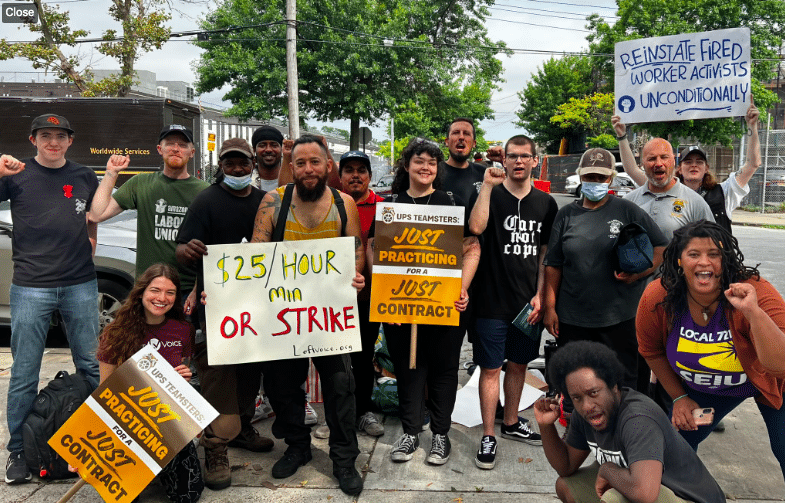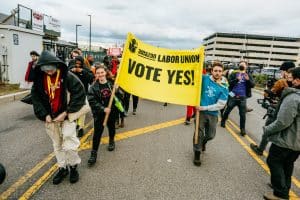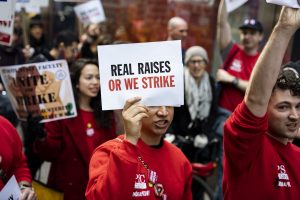On June 27, the contract negotiations between UPS and the Teamsters hit a major roadblock, primarily centered around part-time wages. Over half of the 330,000 Teamsters employed by UPS are part-time workers, predominantly package handlers responsible for moving boxes within the company’s warehouses. We handle an average of 24.3 million packages per day and an estimated 6% of U.S. Gross Domestic Product. As a preloader, I am one of these workers.
Since then, practice pickets have grown and grown, reaching every corner of the country. Last week, 160,000 SAG-AFTRA workers went on strike, just weeks after the Writers Guild of America (WGA) began striking. If you add the UPS Teamsters, in 11 days, half a million workers will be on strike in the United States. The unity among sectors can already be seen at each other’s picket lines. Like in 1997, UPS pilots who are represented by the Independent Pilots Association (IPA) won’t fly if Teamsters go on strike.
The momentum is growing.
In a recent update, the Teamsters union announced that negotiations will resume next week to continue with the economic issues. So far, many gains have been obtained thanks to the credible strike threat and the involvement of the rank and file. As the possibility of a tentative agreement (TA) appears again on the horizon, there is also a chance that the strike date will be postponed. In a previous update, Sean O’Brien stated that if the company presents an acceptable proposal — even at the last minute — a potential strike could be delayed until mid-August.
If this happens, we would have around two weeks to read and vote on the TA while we continue working. If we vote it down, only then can the union call for a strike. Despite the leadership’s previous claims that the union would not let the contract expire without a TA, it’s now possible that we’ll work several weeks under the old contract. These continuous deadline extensions give the strike threat less urgency, and might give the company more space to maneuver.
We’ll see if UPS continues playing games or actually brings a proposal to the table that addresses Teamsters’ demands. Next week will be critical for part timers.
“What do you really get working part-time with UPS?”
UPS, in an attempt to shape public opinion, has launched a public campaign portraying its grueling part-time warehouse jobs as desirable. This campaign has faced significant backlash, with many workers exposing it as nonsense. One need only read the replies to the original tweet to see how part timers really feel.
UPS part-time workers quickly set the record straight, replying: “safety is completely disregarded by management,” “Been making under $20 an hour for 8 years part-time,” ”A bad back. Walked out for any reason a supervisor feels like,” “sweat-soaked,” “very labor intensive job in extreme heat and cold temperatures,” “I wake up at two in the morning to work for hours, get micromanaged and make 65 bucks,” and much more.
One of the glaring lies in the company’s campaign is the claim that part-time workers “make on average $20 an hour after their first 30 days and are guaranteed annual wage increases and cost of living adjustments.” The actual contract reveals that starting wages for part-time workers stand at $15.50 per hour, and even those with over a decade of experience fall far short of that mark.
In some places, UPS pays higher wages using Market Rate Adjustment (MRA), which sets wages for workers depending on the labor market in the region. In areas where the company struggles to find workers, they increase the pay. Workers in expensive cities with a bigger surplus of workers, like New York, are paid on average $5 less per hour than their counterparts in places like Louisville or Seattle.
Despite wages going up for some workers, these wages haven’t been codified into the contract (nor into state or federal law, for that matter) and leaves many precarious with wages that can be cut at any moment. As workers explained on the Roswell Hub podcast, a Seattle UPS hub used MRA to incentivize workers to work certain job positions that are supposed to make the same wage.
The Need for $25/Hour
When examining historical wage trends, the entry-level wage for an hourly employee in 1982 was $8 per hour, which, adjusted for inflation, equates to approximately $25 today. However, the creation of a tiered system within UPS has resulted in a stark wage gap between part-time and full-time workers, undermining the significance of hours worked as the main differentiating factor.
Beyond the issue of starting wages, there are other demands, like catch-up raises for current inside workers, an expansion of guaranteed minimum hours (currently set at 3.5 hours), longer breaks (currently limited to 10 minutes), the implementation of air conditioning systems in warehouses, and an end to harassment and unfair workload distribution. These demands reflect workers’ desire for a more equitable and dignified work environment.
UPS has been reporting record profits on the backs of its drivers and inside workers who kept working throughout the pandemic, risking their lives and safety. The disparity between the company’s massive profits and the workers’ struggle for better compensation has only intensified during the contract negotiations.
UPS workers made the company around $13 billion in profits last year alone. In 2021, UPS CEO Carol B. Tomé made over $27 million. As this Teamsters poster shows, “Tomé makes in just one day more than a UPS worker in a whole year.”
The demands around part-time wages have not been clear. The negotiating committee is subject to a non-disclosure agreement, which keeps us in the dark about negotiations until TAs are reached. With less than two weeks before a possible strike, it is important for rank-and-file members to know the state of negotiations and establish clear wage demands.
If the Teamsters succeed in securing a $25 hourly wage for part-time workers in UPS warehouses, it would not only raise the standard for these workers and benefit over 100,000 families but also inspire employees of other major logistics companies like Amazon and FedEx to fight for higher wages.
Journalist Chris Otts explained on the WDRB News Show that, in a conversation with the International Brotherhood of Teamsters, Vice President Fred Zuckermarn supposedly said “north of $20 an hour is by far a reasonable expectation.” When Otts asked about the $25 an hour that many part-timers are asking he replied “we are still in negotiations.” However, these comments were made off the record and there is no official indication of what wages are being negotiated.
As the contract’s July 31 expiration date approaches and the possibility of a strike grows, these crucial weeks are an opportune moment for organizing efforts to bring part-time workers to the forefront of the struggle and mobilize them to fight for better working conditions.
UPS warehouse workers, many of whom are Black and Brown, have long been invisible to the general public. The pandemic changed all that, illuminating the essential role of logistic workers. Now UPS warehouse workers are at the center of contract negotiations, with our poverty wages and grueling working conditions reaching the national media. Public opinion toward unions is higher than ever, and CEOs are increasingly the target of public criticism. We have an important opportunity to make history, and we have to take it.
We are ready to strike.











